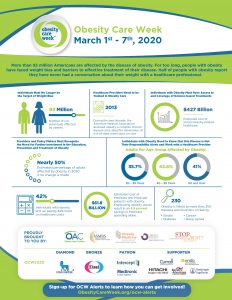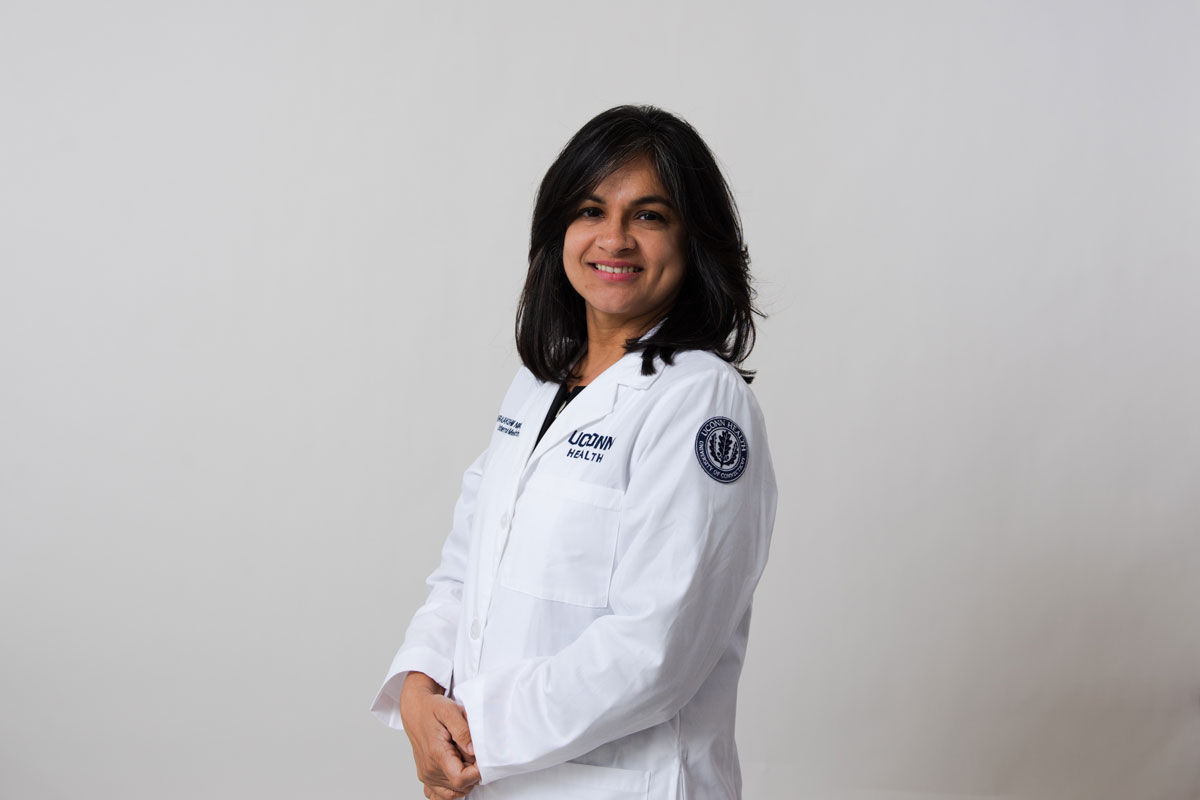With more than 93 million Americans believed to be affected by obesity, a collaboration of national organizations that launched Obesity Care Week is bringing it back for a sixth year, March 1 through 7. Among the objectives is to create a society that values science and clinically-based care.
It’s an objective Dr. Varalakshmi Niranjan shares.
Niranjan is a UConn Health primary care physician whose expertise includes obesity medicine. She sees patients in UConn Health’s West Hartford office, 65 Kane St.
Obesity is linked to more than 200 diseases and disorders, and its strain on the American health care system surpasses $425 billion, according to the Obesity Care Week organizers.
“We associate obesity with disease, many that should be obvious to most of us by now,” Niranjan says. “Excess belly fat tops the list of risk factors that we refer to collectively as the metabolic syndrome. It is the root cause for heart disease, lipid problems, hypertension, type 2 diabetes – and even things like dementia, cancer, polycystic ovarian syndrome and nonalcoholic fatty liver disease. Put another way, if we can treat or avoid obesity today, we won’t have to deal with a lot of other problems tomorrow.”
The designation of “obese” is based on a formula that takes into account a person’s height and weight. This calculation yields what’s known as the person’s body mass index (BMI). A BMI ranging from 18.5 to 24.9 is considered normal. Less than 18.5 is considered underweight, 25 to 29.9 is considered overweight, and a BMI of 30 or greater is considered obese.

“Studies have shown that a reduction of 5% to 10% of body fat helps change the metabolic disease,” Niranjan says. “Lifestyle change with balanced nutrition and physical activity will help achieve this.”
Niranjan offers a physician-supervised weight loss program. The focus is on realistic, sustainable weight loss that treats the sick fat disease.
“If you look at it as a diet, to get down to your goal weight, and then you go back to what you were doing before, you’ll regain the weight,” Niranjan says. “You may want to focus on one change, get used to it, and then add another change.”
A physician-supervised approach to weight loss can lead to a better scientific understanding of weight management, and more of a focus on the long game.
“Remember it is neither a sprint race nor a marathon. It is a journey,” Niranjan says. “I tell patients, all calories are not equal. A piece of fresh fruit and a glass of fruit juice may have similar calorie counts, but the fresh fruit is a much better use of those calories, largely because of the fiber. The numbers on the nutrition label are important, but they’re just one part of making good decisions.”
Working with a physician to treat obesity may present additional options for some patients, including certain medications or surgical intervention. Bariatric surgery has specific guidelines and physicians can make a referral for appropriate patients. Medications shown to treat obesity require a prescription.

“With a multi-disciplinary approach obesity can be managed effectively and complications like blood pressure, diabetes, heart disease, and joint pain can be controlled,” Niranjan says. “Let’s work together and reverse this epidemic.”
In the truest sense, Niranjan also walks the walk. Outside the clinic, she helps lead the UConn chapter of Walk With a Future Doc, which facilitates regularly scheduled free walk-and-talks with physicians, physician trainees, and members of the public. The group plans to resume the walks on the second and fourth Saturday of the month this spring.
March 4 is World Obesity Day.
The Obesity Action Coalition, the Obesity Society, the STOP Obesity Alliance, the Obesity Medicine Association, and the American Society for Metabolic and Bariatric Surgery collectively launched Obesity Care Week in 2015, to address what they describe as a lack of appropriate science and clinically-based care.
Learn more about primary care at UConn Health.



